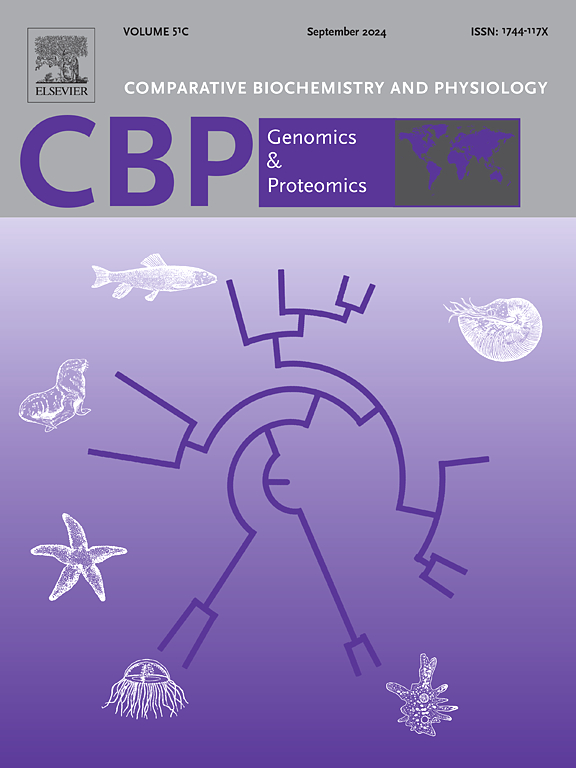Study on the potential impact of sustained high temperatures during non-breeding season on largemouth bass
IF 2.2
2区 生物学
Q4 BIOCHEMISTRY & MOLECULAR BIOLOGY
Comparative Biochemistry and Physiology D-Genomics & Proteomics
Pub Date : 2025-03-31
DOI:10.1016/j.cbd.2025.101501
引用次数: 0
Abstract
With the growing scale of largemouth bass breeding, the demand for seedlings is increasing. As global temperatures rise, it is crucial to study the effects of high temperature their regulatory mechanisms in largemouth bass. In this study, we simulated a high water temperature (28 °C) in the non-breeding season in aquaculture ponds for 28 days to examine the growth, reproduction, metabolism, apoptosis, and methylation markers in largemouth bass; transcriptome analysis was also performed. The results showed no significant difference in body weight between male and female largemouth bass. However, the high-temperature exposed females had reduced growth hormone (GH) and estradiol (E2) levels and elevated cortisol levels. They also showed upregulated expression of AR, cyp19a, igf, fshβ, and lhβ in ovarian tissue. Transcriptomic comparisons between temperature treatments revealed 963 differentially expressed genes in females and 700 in males. Both the ECM receptor interaction and PPAR signaling pathways were significantly enriched. High-temperature enhanced the lipid metabolism process through the PPAR signaling pathway. High temperatures increased oxidative stress in females, which corresponded with increases in SOD, CAT, and GSH-Px, likely to counteract the excess reactive oxygen species. Moreover, endoplasmic reticulum stress was activated, indicated by increases in IRE1 and ATF6, leading to the upregulation of apoptosis-related genes and ovarian cell apoptosis. At high temperature, 5-MC%, demethylase, and methyltransferase were not different in females, while 5-MC% and methyltransferase were higher and demethylase was lower in males. In summary, sustained high temperature affected ovarian development by altering the expression of hormone and gonad related genes and inducing endoplasmic reticulum stress leading to ovarian cell apoptosis. However, low demethylase activity and high genome-wide methylation in the test is suggested that high temperatures may affect testis development via methylation, potentially impacting offspring production.

非繁殖期持续高温对大口黑鲈潜在影响的研究
随着大口黑鲈养殖规模的不断扩大,对种苗的需求也在不断增加。随着全球气温的升高,研究高温对大口黑鲈的调节机制具有重要意义。在本研究中,我们模拟了非繁殖季节28°C的高水温28天,研究了大口黑鲈的生长、繁殖、代谢、凋亡和甲基化标志物;还进行了转录组分析。结果表明,雌雄大口黑鲈体重差异不显著。然而,高温暴露的雌性生长激素(GH)和雌二醇(E2)水平降低,皮质醇水平升高。卵巢组织中AR、cyp19a、igf、fshβ和lhβ的表达也上调。温度处理之间的转录组学比较显示,雌性有963个差异表达基因,雄性有700个差异表达基因。ECM受体相互作用和PPAR信号通路均显著富集。高温通过PPAR信号通路增强脂质代谢过程。高温增加了雌性的氧化应激,这与SOD、CAT和GSH-Px的增加相对应,可能会抵消多余的活性氧。此外,内质网应激被激活,表现为IRE1和ATF6的升高,导致凋亡相关基因上调,卵巢细胞凋亡。高温下,雌性的5-MC%、去甲基化酶和甲基转移酶没有差异,而雄性的5-MC%和甲基转移酶较高,去甲基化酶较低。综上所述,持续高温通过改变激素和性腺相关基因的表达,诱导内质网应激导致卵巢细胞凋亡来影响卵巢发育。然而,在测试中,低去甲基化酶活性和高全基因组甲基化表明,高温可能通过甲基化影响睾丸发育,潜在地影响后代的产生。
本文章由计算机程序翻译,如有差异,请以英文原文为准。
求助全文
约1分钟内获得全文
求助全文
来源期刊
CiteScore
5.10
自引率
3.30%
发文量
69
审稿时长
33 days
期刊介绍:
Comparative Biochemistry & Physiology (CBP) publishes papers in comparative, environmental and evolutionary physiology.
Part D: Genomics and Proteomics (CBPD), focuses on “omics” approaches to physiology, including comparative and functional genomics, metagenomics, transcriptomics, proteomics, metabolomics, and lipidomics. Most studies employ “omics” and/or system biology to test specific hypotheses about molecular and biochemical mechanisms underlying physiological responses to the environment. We encourage papers that address fundamental questions in comparative physiology and biochemistry rather than studies with a focus that is purely technical, methodological or descriptive in nature.

 求助内容:
求助内容: 应助结果提醒方式:
应助结果提醒方式:


